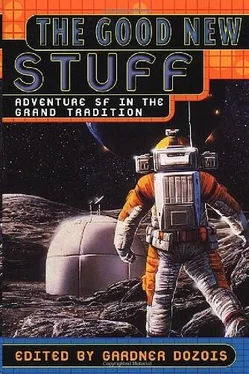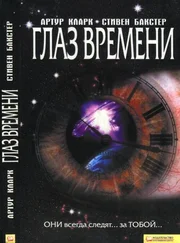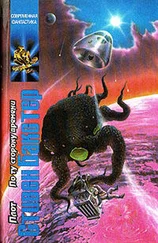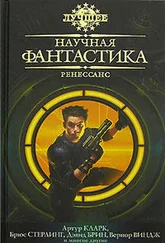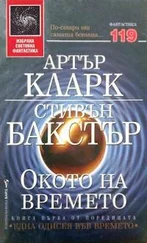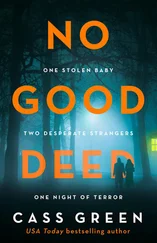Стивен Бакстер - The Good New Stuff
Здесь есть возможность читать онлайн «Стивен Бакстер - The Good New Stuff» весь текст электронной книги совершенно бесплатно (целиком полную версию без сокращений). В некоторых случаях можно слушать аудио, скачать через торрент в формате fb2 и присутствует краткое содержание. Год выпуска: 2002, ISBN: 2002, Издательство: St. Martin's Griffin, Жанр: Фантастика и фэнтези, на английском языке. Описание произведения, (предисловие) а так же отзывы посетителей доступны на портале библиотеки ЛибКат.
- Название:The Good New Stuff
- Автор:
- Издательство:St. Martin's Griffin
- Жанр:
- Год:2002
- ISBN:0-312-26456-9
- Рейтинг книги:3 / 5. Голосов: 1
-
Избранное:Добавить в избранное
- Отзывы:
-
Ваша оценка:
- 60
- 1
- 2
- 3
- 4
- 5
The Good New Stuff: краткое содержание, описание и аннотация
Предлагаем к чтению аннотацию, описание, краткое содержание или предисловие (зависит от того, что написал сам автор книги «The Good New Stuff»). Если вы не нашли необходимую информацию о книге — напишите в комментариях, мы постараемся отыскать её.
The Good New Stuff — читать онлайн бесплатно полную книгу (весь текст) целиком
Ниже представлен текст книги, разбитый по страницам. Система сохранения места последней прочитанной страницы, позволяет с удобством читать онлайн бесплатно книгу «The Good New Stuff», без необходимости каждый раз заново искать на чём Вы остановились. Поставьте закладку, и сможете в любой момент перейти на страницу, на которой закончили чтение.
Интервал:
Закладка:
She knew she would never understand. But it didn't seem to matter. And, as her awareness faded, she felt the Seeker inside her subside to peace.
A final warmth spread out within her. Consciousness splintered like melting ice, flowing away through the closing tunnels of her memory.
R. Garcia y Robertson
GONE TO GLORY
R. Garcia y Robertson made his first sale in 1987, and since has become a frequent contributor to Asimov's Science Fiction and The Magazine of Fantasy & Science Fiction, as well as selling several stories to Amazing, Pulphouse, and Weird Tales, and other markets.
Robertson has made something of a specialty of adventure writing and, in fact, may be one of the very best in the business when it comes to turning out vivid, headlong, fast-paced, colorful, inventive, swashbuckling, and yet keenly intelligent adventure stories. Since adventure writing is still widely considered to be synonymous with "junk" or throwaway writing by many genre critics, stuff not really worth considering (although a really good adventure story is actually harder to write in some ways than more introspective fiction), this may help to explain why Robertson's work, like Robert Reed's, has been largely and undeservedly ignored, and why he's rarely mentioned among the ranks of good new writers of the eighties and nineties— although a good case could be made that he's delivered more pure first-rate entertainment pound for pound than almost any other new writer of the last ten years.
L. Sprague de Camp was clearly one of the major influences on Robertson (although I suspect that George MacDonald Fraser, author of the Flashman series, was a strong influence as well), and, like de Camp, even the most swashbuckling of his adventures contains a generous measure of sly humor; also like de Camp, he makes intensive use of authentic and intensively researched historical settings, and clearly has a love for obscure and little-known corners of history. He's taken us to the bitter days of the Indian Wars on the American frontier in stories such as "The Moon of Popping Trees" and "The Other Magpie," to San Francisco's Chinatown during the Gold Rush days in "Four Kings and an Ace," to the turmoil of the French Revolution in "The Great Fear," to the Cretaceous period to stalk hungry dinosaurs in "The Virgin and the Dinosaur," to ancient Scandinavia in "The Wagon God's Wife," on a trip on a Mississippi paddle wheeler with Mark Twain in "Down the River," to London during the Blitz in "Wendy Darling, RFC," and to Greece in the days before history to deal with a fractious Hercules in "The Moon Maid" — among many other historical milieus that he has made his own.
Some of these stories are fantasy, and so outside our purview here, but his stories about the misadventures of Jake Bento and Peg and their bumbling crew of time-traveling documentary filmmakers— which includes the aforementioned "The Virgin and the Dinosaur" and "Down the River," as well as "On the Way to Gaugamela" and "Seven Wonders," as well as his recent novel The Virgin and the Dinosaur— have been extremely popular with Asimov's readers, as were his non-series time-travel stories "Gypsy Trade" and "Not Fade Away." He's also written baroque and inventive Space Opera or Space Adventures of various sorts, including "The Werewolves of Luna," "Into a Sunless Sea," "The Siren Shoals," "Cast on a Distant Shore," "Fair Verona," "Starfall," and the exuberant picaresque adventure that follows, "Gone to Glory," which takes us out across the boundless prairies of an exotic and dangerous alien world, in search of answers that it would be safer not to find….
Robertson's books include, The Spiral Dance, The Virgin and the Dinosaur, Atlantis Found, and, most recently, American Woman. His most recent book is his first short-story collection, The Moon Maid and Other Stories. Several of his recent stories, including "Gypsy Trade," have been optioned for the movies, although none of them have made it to the screen as yet. He was born in Oakland, California, has a Ph.D. in the history of science and technology, and, before becoming a full-time writer, taught those subjects at UCLA and Villanova. He lives in Mt. Vernon, Washington.
Let's hope that as the years to come take us into the new century, Robertson gets some of the respect and attention he deserves. In the meantime, if you're looking for first-class adventure fiction, watch for his name— you're unlikely to be disappointed.
THE SAD CAFE
Defoe sat at one of the Sad Cafe's outdoor tables, soaking up gin slings and watching an energetic couple attempting to mate in midair, wearing nothing but gossamer wings and happy smiles. This pair of human mayflies had to be used to the exercise— neither showed a gram of fat or a bit of shame.
The four-hundred-year-old bistro stood in an open-air park on the Rue Sportif near Spindle's main axis, where g forces were low and the fun never slowed. Holodomes and hanging gardens arched overhead. Beyond the mating couple, halfway up Spindle's curve, nude bathers raised slow-motion splashes in a low-g pool. Not a shoddy spot for doing nothing. Defoe ordered his third (or maybe sixth) sloe gin sling from a roving cocktail bar, a barrel-shaped dispenser doing a lazy drunkard's walk between the tables, happily doling out drinks. Never asking for credit or expecting a tip. Human service was rarer than saber-tooth's teeth on Spindle.
Sipping his sloe gin, Defoe listened with mild disinterest to priority beeps coming over the comlink clipped to his ear. The first calls weren't for him, but they were coming fast and close together. Always a sad sign. Hoping not to be dragged too deeply into other people's troubles, he had his navmatrix decode the binary signals. The pilot's navmatrix grafted into the back of his skull was immune to alcohol. Defoe could down a dozen gin slings and still pilot a tilt-rotor VTOL in a blinding sandstorm or rendezvous with a starship— if the need arose. Only the need never arose. Not here. Not now.
First came a distress bulletin, direct from dirtside.
Then a standby alert.
Followed by a formal AID action request.
The final call was for him. Defoe answered in his off-duty voice.
Salome, his section head, came on-line. Her parents had been ultraorthodox Satanists (who believed John the Baptist had it coming), and her strict religious upbringing made Salome controlled and precise, with barely a wayward impulse. Except for her hair, which tumbled in untamed curls and wild midnight-blue ringlets past her hips, almost to the floor. She sounded soft and winsome over the comlink, a sure sign HQ was in second-degree alarm— Salome never courted underlings unless she needed something. "There's an AID team down in Tuch-Dah country. They want us to send someone."
Defoe snickered. "Who's the lucky sucker?"
"AID wants an 'experienced surface hand.' Someone who knows the Tuch-Dah. You've been fortunate with them."
"Fortunate? Not hardly. Incredibly lucky would be nearer the mark." Not the sort of luck Defoe aimed to lean on.
Salome persisted. "But you have come through intact— always a plus— and saved us a lot of trouble." And saved the Tuch-Dah a lot of trouble, thought Defoe, not that the ungrateful bastards ever seemed to notice. "Besides, you're fresh up from the surface; it won't be so much of a shock."
"Right. With four months up-time coming." Up-time as in up here— on Spindle— where it was too perfect a day to contemplate work. Defoe had just done a solid eighteen weeks on Glory. Great-aunt Tillie in Alpha C would do duty dirtside before he went back early. "Last time AID lost a team, the problem solved itself— Tuch-Dahs sent their heads back in a leather bag."
"Marvelously considerate. But we can't always count on it. Take a couple of weeks," Salome suggested. "Clear this up, and we'll make it five months." That was double time. A rare offer. AID had to be in a fine panic.
Читать дальшеИнтервал:
Закладка:
Похожие книги на «The Good New Stuff»
Представляем Вашему вниманию похожие книги на «The Good New Stuff» списком для выбора. Мы отобрали схожую по названию и смыслу литературу в надежде предоставить читателям больше вариантов отыскать новые, интересные, ещё непрочитанные произведения.
Обсуждение, отзывы о книге «The Good New Stuff» и просто собственные мнения читателей. Оставьте ваши комментарии, напишите, что Вы думаете о произведении, его смысле или главных героях. Укажите что конкретно понравилось, а что нет, и почему Вы так считаете.
